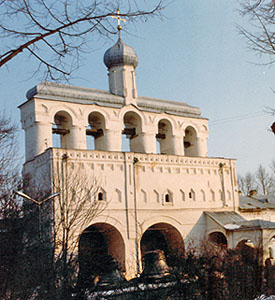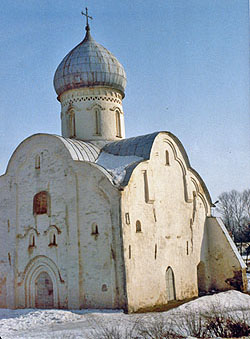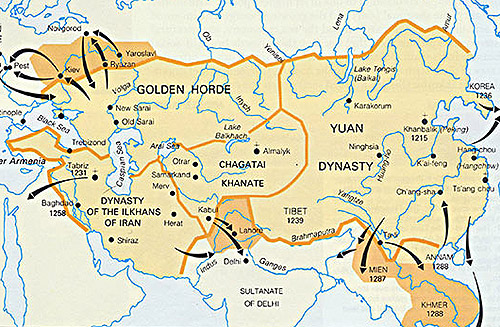

I am working on putting together some further Novgorod images.
With the disintegration of the Kievan state, different political centers emerged in Russia: Kiev, Vladimir, Moscow and Novgorod (all to the north of Kiev). But Russian society still faced external pressures. From the West, the Teutonic Knights and the Swedes were moving eastwards into the Baltic coast.
The Teutonic knights were a crusading order of the church formed in the 1100s. (Is that not a weird statement!) The Knights had moved to Poland and accepted an imperial, and papal, mandate to conquer the Prussians, some still-pagan peoples living on the shores of the Baltic Sea. The conquest of the Prussians lasted decades and was accomplished with a lot of violence (in the name of God, of course). Most of the Prussians were either exterminated or enslaved; they were also technically converted to Christianity. Having accomplished the subjugation of the Prussians, the Knights turned their attention further eastward in the direction of northwestern Russia.
The key figure in defeating both the Swedes and the Teutonic Knights was Prince Aleksandr Iaroslavich "Nevskii" (1220-1263). Nevskii grew up in Vladimir, but in 1236 he became prince of Novgorod with the task of leading the city's army to defend the city. (How old was he!). In 1240, he led the army into battle against the Swedes near the rivers Izhora and Neva and defeated the Swedish army on 15 July 1240. (For this he became known as "Nevskii.") Soon thereafter, the Teutonic Knights threatened the city. Nevskii returned from his exile--No need to go into details--and gathered his army again. On 5 April 1242 Nevskii faced the enemy and defeated the Teutonic Knights in the Battle on Lake Peipus ("Battle on the Ice") when the thawing ice on the lake cracked under the weight of the heavily armored knights on horseback. The invasions of Russia from the west and the north had been stopped thanks to Nevskii who later became Grand Prince of Russia. After his death, he was initially buried in Vladimir (later moved). The Russian Orthodox Church also recognized Nevskii as a saint in 1547. Take some time and watch Sergei Eisenstein's 1938 movie on Aleksandr Nevskii, one of my favorites, with Sergei Prokofiev's score (unbelievable music). While far from being accurate historically, the movie is still a must see (and consider the year in which it was released).
While Russia had been able to deal with the threats from the north and west, the real danger came from the east in the form of the Mongols.

Map of the Mongol Empire
The Mongols created the greatest empire the world has ever known, and they had an enormous impact on the course of Russian history. (As graduate students, we always used to joke that you could hear the Mongol hoofbeats echoing through Russian history. Whenever a disaster befell Russia, we would just blame it on the Mongol legacy, or whenever a leader had to make a decision, we would say he heard those hoofbeats!) Don't forget that from the Mongol point-of-view, "Russia" was only the frontier of their great empire stretching across Eurasia. See the map just above.
The Mongols first appeared on the Kievan scene in 1223 when they defeated a united Kievan army on the banks of the Kalka River, but the Mongols did not follow up their victory with an immediate invasion. In 1236 they returned with an army of over 150,000 led by Batu (1205?-1255). Between 1236 and 1240 Russian cities were destroyed everywhere as the Mongols ruthlessly stormed across Russia leaving utter devastation and destruction behind. (Only Novgorod and Pskov escaped damage.) By 1242 the Mongols ("Tatars"--not tartars--as they were known to the Russians) had set up shop with the capital of the "Golden Horde" at Sarai on the lower Volga River.
There is still considerable debate over the actual impact of the Mongols on the course of Russian history. For a long time this period was simply seen as the Mongol Yoke, a time of black oppression and devastation lasting about two centuries, but the truth was far from that, and careful historical work, by Charles Halperin among others, in the last few decades has begun to paint a different picture of the Russian-Mongol relationship, but it was never a happy and friendly one. After all, the Mongols were the conquerors.
In terms of the immediate Mongol impact, for the most part the Mongols did not interfere in the day-to-day affairs of the Russians; they were content to just pick/approve a Grand Prince and let him control Russian affairs as long as the annual tribute was paid. This meant, in effect, that the Mongols did not much interfere in terms of Russian society, religion or culture, etc. But they did cut most of Russia off from what was going on in Western Europe in the thirteenth and fourteenth centuries; this tended to make Russian religious and cultural developments more parochial. (That is not the exact word that I was looking for right there, but it will have to do.). There were periodic re-invasions by the Mongols and that meant a bit more destruction, and there is no doubt that it took some time to recover from the economic and physical destruction (loss of life) from the initial invasions. It is also pretty clear that the Mongols hastened the break-up of what was left of Kievan Rus', and this did lead to a split of "Russia" into southern, western and eastern parts. I also tend to believe that it is pretty true that the Mongol invasion allowed Moscow, a previously-minuscule petty principality, to emerge as the center of medieval Russia since that is where the Mongols recognized the Grand Prince as residing. Finally, more debatable re Mongol influence, is the premise advanced by some historians that the Mongols introduced elements of what has been called "oriental despotism" into Russian political practice, leading eventually to the emergence of the Russian autocracy.
- Mongols in World History
- The Mongol Empire
- The Mongol Khans
- Golden Horde (wikipedia)
- Mongol Invasion of Russia (wikipedia)
- Khanate of the Golden Horde
- Genghis Khan and the Mongols
- Welcome to The Realm of The Mongols! has some very interesting information about the Mongols
- Charles Halperin, Russia and the Golden Horde: The Mongol Impact on Medieval Russian History (1985)
- Robert Crummey, The Formation of Muscovy, 1304-1613 (1987)
- Ian Grey, Ivan III and the Unification of Russia (1964)
- George Vernadsky, The Mongols and Russia (1953)
- John Fennell, The Emergence of Moscow, 1304-59 (1968)
- Viktor Lazarev, Moscow School of Icon Painting (1980)
Some recommended websites
- Some lectures by the late Professor Michael Boro Petrovich are available on the web: The Mongols, The Mongol Impact, The Rise of Moscow, Ivan the Great, the Third Rome and The Service State.
- On Russian icons, see Ikons: Windows into Heaven and Icon Painting, which both include explanations. Russian Icons and Orthodox Icons are links to images of specific icons.
- Muscovite Period (Excerpts from Glenn Curtiss, Russia: A Country Study, 1996)
- The Xenophile historian has some remarks about medieval Russia. See his sections The Mongol Conquest, Alexander Nevsky and the Golden Horde, Lithuania, The Rise of Muscovy and Ivan the Great
- History of Moscow, cover the history of Moscow to the end of the sixteenth century.
- For examples of medieval Russian architecture, see the Moscow Kremlin, Muscovite Kremlin, Lord Novgorod the Great or Pskov
- The Novgorod Chronicle: Selected Annals
- With regard to the Russian Orthodox Church, find some simple explanations of Features and Practices of the Russian Orthodox Church; view a very, very interesting Slide Show on Russian Orthodoxy; and read some commentary on Russian Church Architecture (but no images).